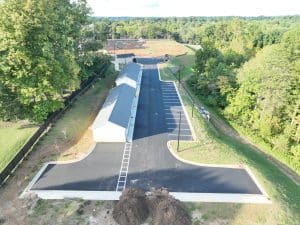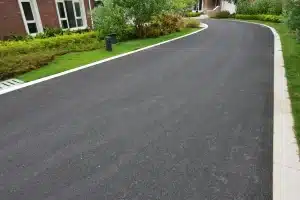Many of our clients ask this question. However, it’s important to note that there’s a difference between “can” and “should”. There are several things to take into consideration if you are considering having asphalt placed on top of your concrete driveway. While it can reduce labor costs and time, it’s not the best solution for all situations and there are several things you need to consider.
If you are considering having asphalt put on top of your concrete driveway, you should hire a professional paver to handle the project. At Prime Paving, we strive to ensure that you are 100% satisfied with your project upon completion. Therefore, if you have concrete, we recommend that the concrete be removed first. Fortunately, you can recycle concrete, so you don’t have to worry about wasted materials.
Things to Consider Before Putting Asphalt on Top of Concrete
While it’s true that asphalt is used every year to repave miles of concrete roads and highways, it may not be the best option for your driveway. There are several maintenance requirements that you’ll need to be ready to deal with if you choose to do this. The biggest thing to keep in mind is how the stability of the concrete affects the condition and life expectancy of the asphalt. This varies depending on several factors, including the condition of the concrete, the climate, and more.
Side Effects of Putting Asphalt on Top of Concrete
Pouring asphalt on existing concrete comes with several risks, the biggest one is the possibility of an unstable concrete base. If you’re using existing concrete, take the time to examine the quality before adding the asphalt.
If the concrete base is unstable, it can become further compromised from cracking as it shifts from:
- Traffic
- Fluctuations in temperature
- Freezing/thawing of ice/snow
When you pour asphalt over concrete, it’s important to note that the lifespan of the asphalt is affected by the quality/integrity of the concrete. If there are cracks or the concrete base is uneven, the asphalt will be compromised. If you don’t have a good foundation, you’ll have problems in the future with your asphalt surface.
Should Concrete be Removed First?
If the concrete is older and is cracked due to expansion and contraction, it should be removed first. It’s best to start from the ground so that you can have a structurally sound base. If not, the quality and integrity of the asphalt will suffer.
Another reason to consider removing concrete is to see what is under it- you may have holes where water and ice can form, which ruins the base. In some cases, you may need to have the existing surfaces excavated to create a reliable sub-base.
Since asphalt is not a compact surface like concrete, it can contract and expand with temperature fluctuations. Asphalt alone will allow the surface to last longer and maintain its appearance longer than pouring asphalt on top of concrete.
While putting asphalt on top of concrete may seem cheaper at first glance, you’ll end up spending more over time on maintenance costs. Removing concrete may cost more upfront, but it will save you money in the long run because asphalt alone doesn’t require as much maintenance.
Discuss Your Options with Prime Paving
At Prime Paving, it’s important to us that our clients have the best information to make the right decision for paving their driveways, parking lots, and other surfaces. We serve clients all across North Carolina. Contact us today if you are trying to decide between having asphalt put on top of your concrete surface or having the concrete removed first- we can explain what your best options are. We can answer any of your questions and address any of your concerns when it comes to asphalt paving- whether you have a commercial or residential property.





